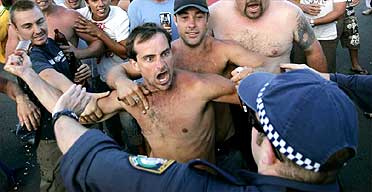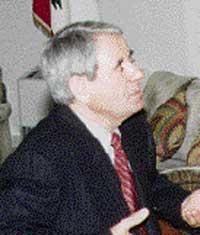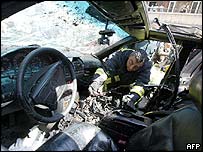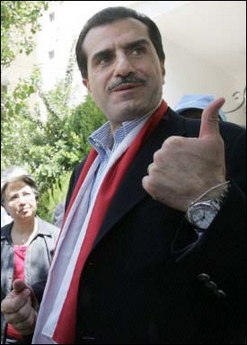 SYDNEY, Australia -- Australian Prime Minister John Howard on Monday condemned a day and night of race riots in Sydney's beachside suburbs, but said he did not believe Australian society had an undercurrent of racism. Howard was speaking as police formed a strike force to track down the instigators of the running battles that involved drunken mobs of white men yelling racial slurs, young men of Lebanese descent and hundreds of police.
SYDNEY, Australia -- Australian Prime Minister John Howard on Monday condemned a day and night of race riots in Sydney's beachside suburbs, but said he did not believe Australian society had an undercurrent of racism. Howard was speaking as police formed a strike force to track down the instigators of the running battles that involved drunken mobs of white men yelling racial slurs, young men of Lebanese descent and hundreds of police.
The fighting left 31 people injured, including police and paramedics. One was hospitalized after being stabbed in the back by a man police said was Middle eastern in appearance. There were 16 arrests. "What we have seen yesterday is something I thought I would never see in Australia, and perhaps we have not seen in Australia in any of our lifetimes, and that is a mass call to violence based on race," Community Relations Commission chairman Stepan Kerkyasharian told Sky News.Police chief Ken Moroney called the rioting among "the worst violence that I have ever seen in my policing service of 40 years."
 Beirut - The Lebanese cabinet decided late Monday to call on the United Nations to investigate a wave of killings of anti-Syrian individuals and to form an international court to investigate the murder of former premier Rafik Hariri. Pro-Syrian Hezbollah and Amal deputies suspended their participation in the Lebanese government to protest a vote calling for an international tribunal and to 'widen the mission of the U.N. investigative team to cover all the assassinations that took place since October 2004'.
Beirut - The Lebanese cabinet decided late Monday to call on the United Nations to investigate a wave of killings of anti-Syrian individuals and to form an international court to investigate the murder of former premier Rafik Hariri. Pro-Syrian Hezbollah and Amal deputies suspended their participation in the Lebanese government to protest a vote calling for an international tribunal and to 'widen the mission of the U.N. investigative team to cover all the assassinations that took place since October 2004'.
'We are suspending our participation in the government in order to consult our leaderships after a vote by the government in favour of an international tribunal,' Hezbollah MP and Energy Minister Mohammed Fneish told reporters. 'It is not a resignation,' Fneish said. The two Shiite groups oppose an international court saying 'it enhances international interference in Lebanon'. The cabinet also decided to ask for an international court to be formed either in Lebanon or elsewhere.
 December 12: Prominent anti-Syrian MP and journalist Gibran Tueni and three others are killed in a car bomb attack as they travel through the Mekallis area of eastern Beirut.
December 12: Prominent anti-Syrian MP and journalist Gibran Tueni and three others are killed in a car bomb attack as they travel through the Mekallis area of eastern Beirut.
September 25: May Chidiac, a well-known television news journalist for the Lebanese Broadcasting Corporation, is seriously wounded by a car bomb in Jounieh, north of Beirut.
September 17: A powerful blast rocks the Ashrafiyeh district of Beirut, killing one person and injuring at least 22 more.
August 22: At least two people are injured when an explosion takes place outside a hotel and shopping centre in the Zalka suburb of Beirut.
July 22: Several people are injured in a car bomb blast in a busy Beirut street.
July 12: Former defence minister Elias Murr - a staunch supporter of Syria - and two others are killed in a bomb attack as his motorcade passes through the affluent Beirut suburb of Antelias.
 AP Diplomatic Writer WASHINGTON (AP) - Secretary of State Condoleezza Rice condemned Monday's slaying of a Lebanese journalist who was critical of Syrian involvement in his country as a ``vicious act of terror.'' She conferred with France's foreign minister on how to bring new pressure on Damascus.
AP Diplomatic Writer WASHINGTON (AP) - Secretary of State Condoleezza Rice condemned Monday's slaying of a Lebanese journalist who was critical of Syrian involvement in his country as a ``vicious act of terror.'' She conferred with France's foreign minister on how to bring new pressure on Damascus.
It was not immediately clear whether the United States and France, its partner in trying to loosen Syria's grip on its weaker Arab neighbor, were planning moves in the U.N. Security Council, which already has demanded that Syria end its presence in Lebanon. Journalist and lawmaker Gibran Tueni, a relentless critic of Syria who spent months in France fearing assassination, was killed in a car bombing Monday, only a day after returning to his homeland. ``I am outraged by the assassination,'' Rice said, offering her condolences to his family. She called Tueni a Lebanese patriot and a voice of freedom.
Khazen History


Historical Feature:
Churches and Monasteries of the Khazen family

St. Anthony of Padua Church in Ballouneh
Mar Abda Church in Bakaatit Kanaan
Saint Michael Church in Bkaatouta
Saint Therese Church in Qolayaat
Saint Simeon Stylites (مار سمعان العامودي) Church In Ajaltoun
Virgin Mary Church (سيدة المعونات) in Sheilé
Assumption of Mary Church in Ballouneh
1 - The sword of the Maronite Prince
2 - LES KHAZEN CONSULS DE FRANCE
3 - LES MARONITES & LES KHAZEN
4 - LES MAAN & LES KHAZEN
5 - ORIGINE DE LA FAMILLE
Population Movements to Keserwan - The Khazens and The Maans
ما جاء عن الثورة في المقاطعة الكسروانية
ثورة أهالي كسروان على المشايخ الخوازنة وأسبابها
Origins of the "Prince of Maronite" Title
Growing diversity: the Khazin sheiks and the clergy in the first decades of the 18th century
Historical Members:
Barbar Beik El Khazen [English]
Patriach Toubia Kaiss El Khazen(Biography & Life Part1 Part2) (Arabic)
Patriach Youssef Dargham El Khazen (Cont'd)
Cheikh Bishara Jafal El Khazen
Patriarch Youssef Raji El Khazen
The Martyrs Cheikh Philippe & Cheikh Farid El Khazen
Cheikh Nawfal El Khazen (Consul De France)
Cheikh Hossun El Khazen (Consul De France)
Cheikh Abou-Nawfal El Khazen (Consul De France)
Cheikh Francis Abee Nader & his son Yousef
Cheikh Abou-Kanso El Khazen (Consul De France)
Cheikh Abou Nader El Khazen
Cheikh Chafic El Khazen
Cheikh Keserwan El Khazen
Cheikh Serhal El Khazen [English]
Cheikh Rafiq El Khazen [English]
Cheikh Hanna El Khazen
Cheikha Arzi El Khazen
Marie El Khazen